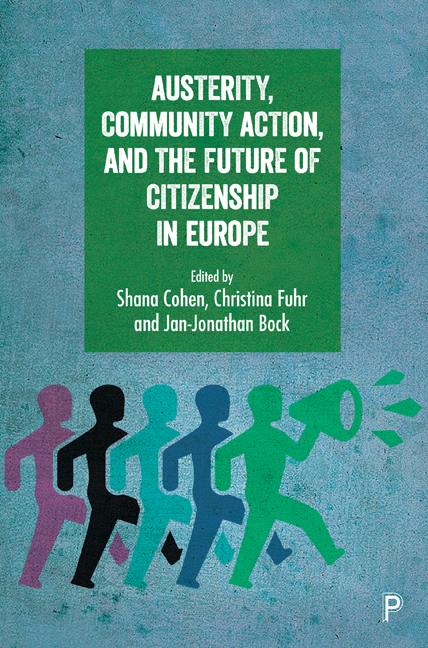Book contents
- Frontmatter
- Dedication
- Contents
- Acknowledgements
- Notes on contributors
- one Introduction: social activism, belonging and citizenship in a period of crisis
- Part I The social consequences of welfare policy
- Part II The practice of social good
- Part III Social change and neoliberalism
- Part IV Situating solidarity in perspective
- Index
Five - Breaking the hold of debt: Cambridge Money Advice Centre
Published online by Cambridge University Press: 05 April 2022
- Frontmatter
- Dedication
- Contents
- Acknowledgements
- Notes on contributors
- one Introduction: social activism, belonging and citizenship in a period of crisis
- Part I The social consequences of welfare policy
- Part II The practice of social good
- Part III Social change and neoliberalism
- Part IV Situating solidarity in perspective
- Index
Summary
Situated 80 km north of London, Cambridge is a world-famous university city, and very much a beacon of prosperity and enterprise in the Home Counties that surround the capital. The well-established university and teaching hospital, together with the recent growth of biomedical, science and business parks, creates the illusion of a city with exclusively affluent, middle-class residents. But among its population of 124,000 (in 47,000 households, UK 2011 census figures) there exists a significant number of people who live in relative poverty, typically in social housing on post-war estates to the north and east of the historic city centre. Cambridge City Council has stated that, while the average annual household earnings in Cambridge were £37,344 in 2012, a fifth of households in the city has annual earnings of £19,169 or less, and one in 10 households earns £16,518 or less each year (Cambridge City Council, 2014). It was the acknowledgement that Cambridge is a two-tier society – where the ‘have-nots’ live on minimum wage employment or state benefits and are vulnerable to falling into debt – that stirred the compassion of the founding members of the Cambridge Money Advice Centre (MAC). In 2005, drawing volunteers from several Cambridge churches, MAC began offering free debt advice to anyone who felt they could not manage their debts. In subsequent years, we have built up a wealth of experience of working with all sections of the city and surrounding towns and villages. This period of time has seen economic prosperity and high public spending, followed by a financial crisis, which spawned a decade of deepening austerity that is nevertheless showing signs of slow economic recovery.
The Money Charity estimates that, excluding mortgages, the average debt per UK household is currently £7,118 (The Money Charity, 2017). Other estimates that make media headlines are as high as £9,000 (Rickard Straus, 2015). Of more importance is the level of ‘unmanaged debt’. The Money Advice Service (MAS) defines this as finding bills and credit commitments a heavy burden, or having fallen behind or missed payments in at least three of the preceding six months. MAS estimates that an alarming one in six adults in the UK is over-indebted.
- Type
- Chapter
- Information
- Austerity Community Action and the Future of Citizenship , pp. 81 - 94Publisher: Bristol University PressPrint publication year: 2017



